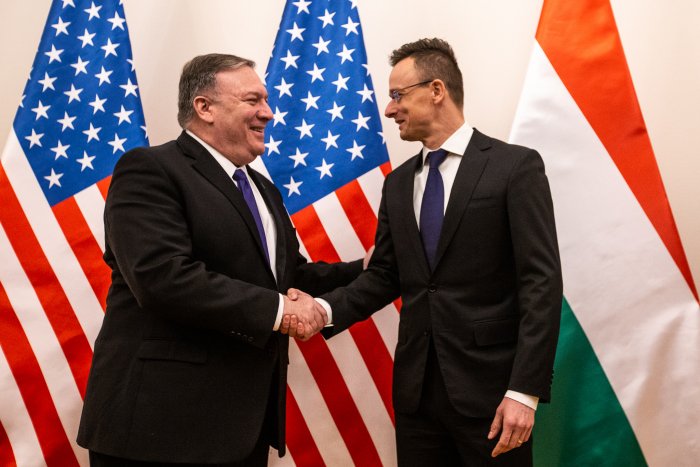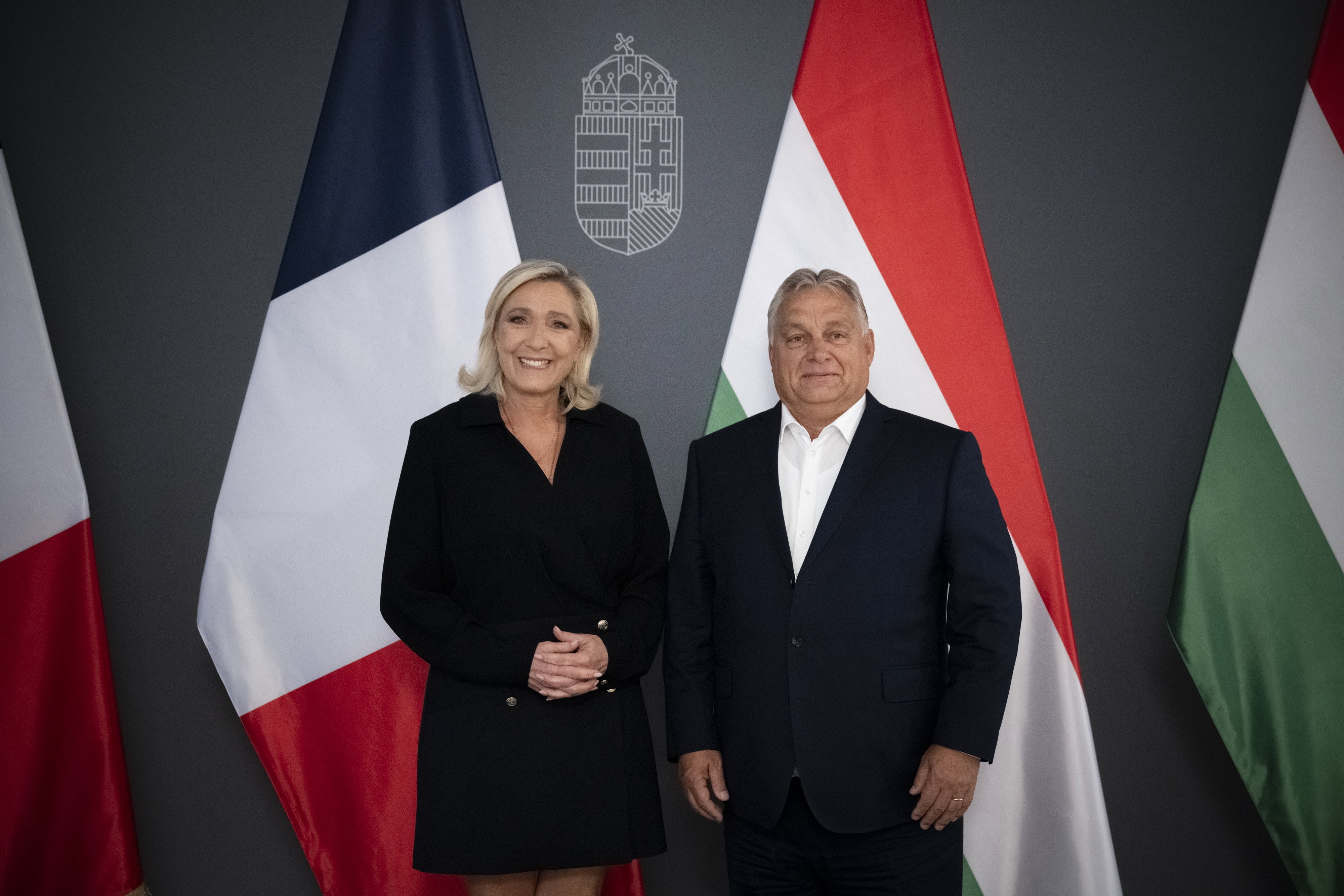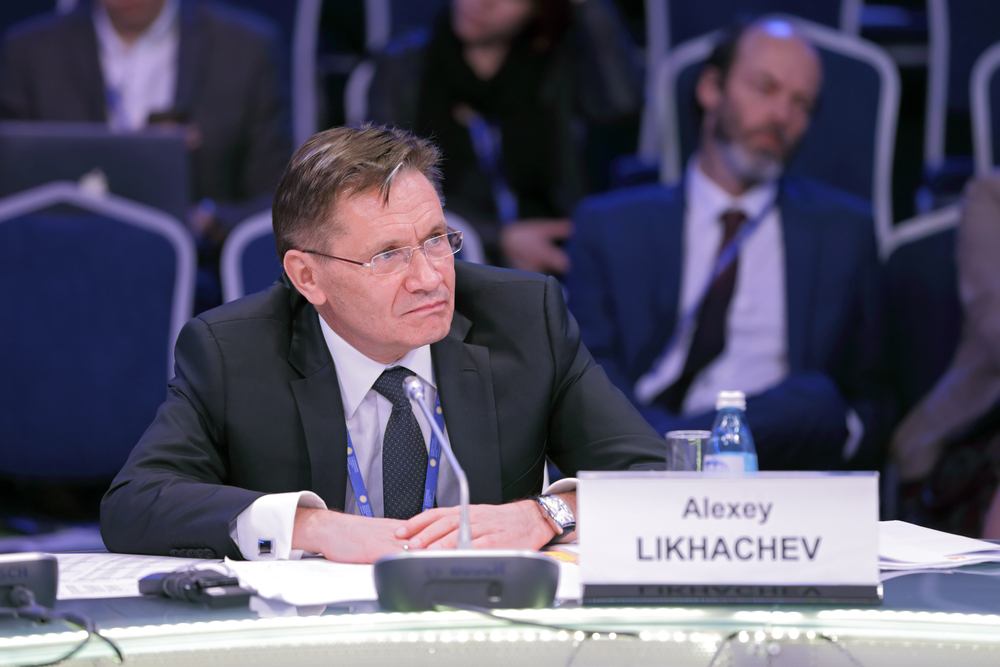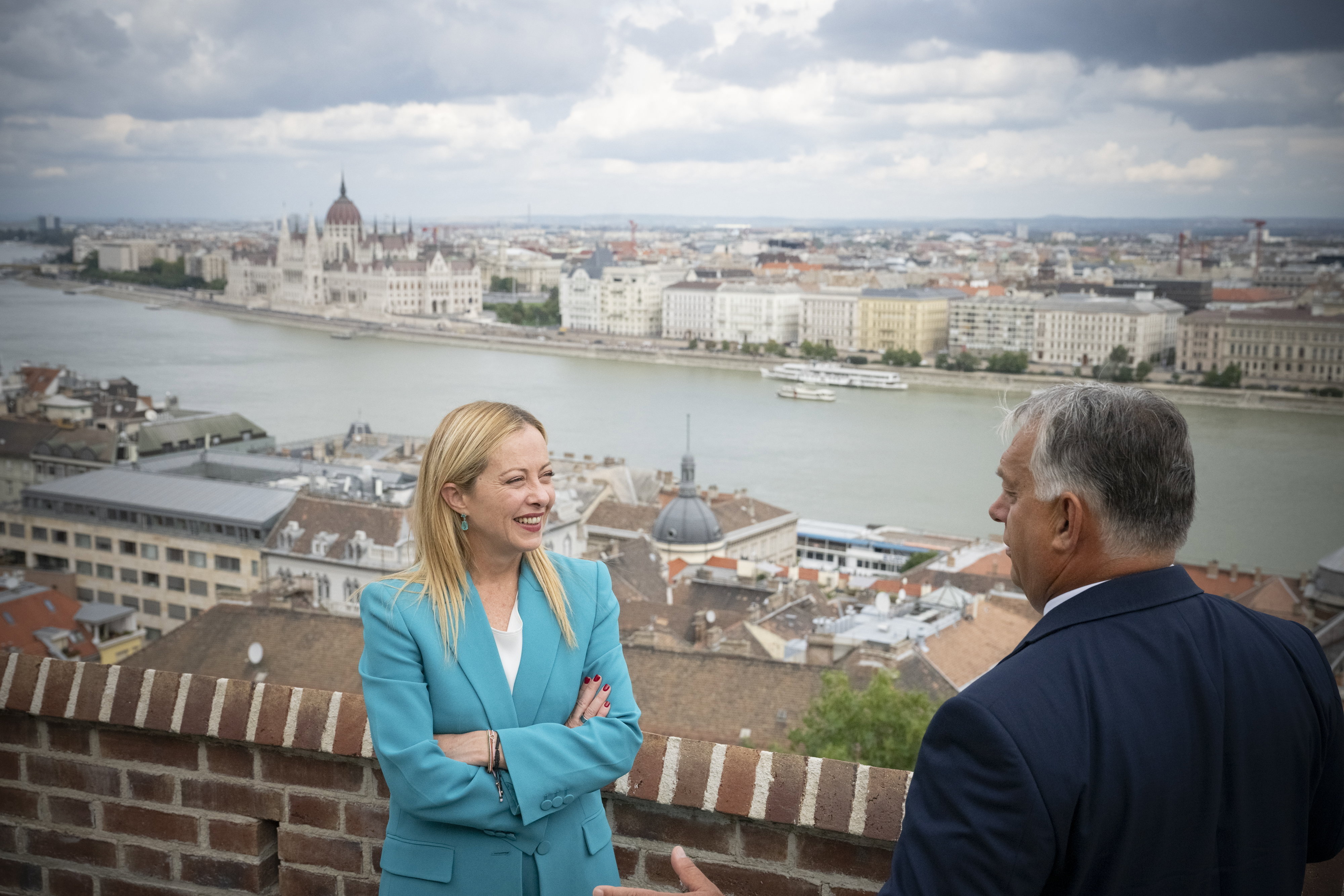Pompeo wants to expand U.S. engagement in region

Photo: Árpád Földházi, Kormany.hu
U.S. Secretary of State Mike Pompeo visited Budapest on Monday, announcing a shift in U.S. foreign policy towards the Central European region in a joint press conference with Hungarian Minister of Foreign Affairs and Trade Péter Szijjártó. He also met with Prime Minister Viktor Orbán and representatives of civil society.
Pompeo shakes hands with Szijjártó (photo: Árpád Földházi/kormany.hu)
Pompeo noted that the U.S. has been a "no show" in the region for a long time and promised that the Trump administration will pursue a closer relationship with countries in the region, in what he regarded as a shift from the policies of the Obama era.
Pompeo lauded the relationship between the two countries, but called attention to the potential division Russia is seeking to widen between the region’s NATO countries with its activities in Ukraine, while noting the importance of freedom and civil society to counter the authoritarian tendencies of Russia and China.
The Hungarian government and the Trump administration have a common or similar approach to a number of general policy issues and matters of foreign policy, said Szijjártó. Both governments follow a patriotic policy which places national interests first, and they believe that a fundamental responsibility of the state is ensuring the security of its own citizens.
At the same time, the minister said Hungary cannot view the situation in Ukraine as a matter of geopolitics because of the fate of 150,000 ethnic Hungarians living in the west of the country.
Energy diversification
Szijjártó said that he discussed possible means of energy diversification with his American counterpart, but described the West as "hypocritical" about Russian energy ties, noting the gas pipeline projects currently underway between Russia and the EU.
The minister also dismissed allegations that Hungary serves as a gateway for China into the EU, citing that Hungary is only responsible for 1.2% of Chinese exports into the EU. Additionally, he said that Hungary is committed to NATO, with the country set to expand its presence in Kosovo and Afghanistan by 108 persons.
Szijjártó called attention to the importance of U.S. companies to the Hungarian economy, and added that he had urged ExxonMobil to begin gas projects in Romania which may open new paths to energy diversification. Regarding LNG exports from Krk, Croatia, he noted that the price offered to Hungary was too high to make it a feasible option at the moment, online news portal index.hu wrote.
According to a transcript of the press conference, the two diplomats also agreed on the renewal of a defense cooperation agreement.
"This agreement was completed in 1997. The world has changed ever since. There are tremendous new challenges, security threats. Therefore, we agreed that it was just due time to modernize this agreement," Szijjártó said. "Last Friday, we managed to conclude these talks. We managed to finalize the text, and we agreed upon that text. Therefore, next week, the defense committee of the Hungarian Parliament is going to discuss that."
Security risks, rule of law
Later Monday, Pompeo also met with Prime Minister Viktor Orbán for a "working dinner." Robert Palladino, deputy spokesperson of the U.S. Department of State, said they met "to discuss U.S.-Hungary bilateral relations, including ongoing U.S. efforts to bolster the U.S.-Hungary security relationship, counter Russian aggression, and strengthen NATO."
"The Secretary welcomed the news that Hungary will be acquiring stronger defense capabilities from the United States," said Palladino. "The two also discussed regional stability, EU integration for the Western Balkans, the need for Central European energy diversification, and shared perspectives on the Transatlantic relationship," he added.
Earlier in the day, Pompeo entertained questions about a variety of topics at the U.S. Embassy in Budapest, according to a press release from the embassy. These included the issue of Chinese tech firm Huawei and its presence in Hungary.
"What’s imperative is that we share with [Hungary] the things we know about the risks that Huawei’s presence in their networks presents," said Pompeo, describing these as "actual risks to their own people, to the loss of privacy protections for their own people, the risk that China will use this data in a way that is not in the best interest of Hungary. We have an obligation to share that information with them, and we will do so," he added.
Pompeo also met with representatives of civil organizations during his visit, state news wire MTI cited the Hungarian Helsinki Committee and the Hungarian Civil Liberties Union as saying. Both organizations have been among the NGOs targeted repeatedly by the government in recent times.
In his remarks at the U.S. Embassy prior to meeting the NGOs, Pompeo was quoted as saying that he was "anxious to hear from them about the conditions they believe Hungary finds itself in, their thoughts on how best to move forward."
"We’ll certainly make the case about the things that we see that we
wish were different here," he added. "America is never shy about promoting its value set – our concern about humanitarian situations, about civil liberty, [the] rule of law."
In answer to a question about whether he expects the Hungarian government to listen to U.S. concerns, Pompeo said he believes they are welcoming United States engagement.
"I think for a long time we shunned them in a way that drove them to fill a vacuum with folks who didn’t share our values," he noted. "The Russians and the Chinese ended up getting more influence here. They do not remotely share the American ideals that we care so deeply about. So yeah, I’m confident they’ll listen. We’ll have a good conversation."
SUPPORT THE BUDAPEST BUSINESS JOURNAL
Producing journalism that is worthy of the name is a costly business. For 27 years, the publishers, editors and reporters of the Budapest Business Journal have striven to bring you business news that works, information that you can trust, that is factual, accurate and presented without fear or favor.
Newspaper organizations across the globe have struggled to find a business model that allows them to continue to excel, without compromising their ability to perform. Most recently, some have experimented with the idea of involving their most important stakeholders, their readers.
We would like to offer that same opportunity to our readers. We would like to invite you to help us deliver the quality business journalism you require. Hit our Support the BBJ button and you can choose the how much and how often you send us your contributions.









